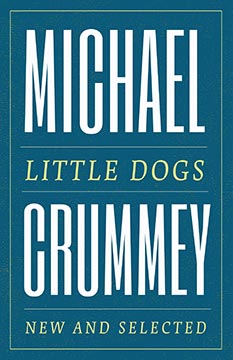Little Dogs, by Michael Crummey, is a “best of” anthology of poetry drawn from four previously published works along with a handful of new poems thrown in at the end for good measure. A body needs poetry. In these times (not of Covid-19 but of a rising secularism), poetry is the last toehold of spiritual writing. Not that there’s anything explicitly spiritual in Crummey’s writing. But it’s spiritual insofar as it concerns dreams, memory, fathers, the dead, and frail loves.
I am, of course, attuned to certain specific idiosyncratic concerns:
- Fever
In these times (not of rising secularism, but of Covid-19), fever is an obvious concern. “Fever” is also the name of a poem (p. 57) about an illness that ripped through a community in Prince Edward County 135 years ago. It includes these lines:
How ancient those lives seem now,
ravaged and almost past remembering—
even God struggles to untangle the skein
of their voices from the stars,
to recall the simple clarity of prayers
that kept them awake at night,
their faces in lamplight dazzled with tears.
The poet confronts the past and remarks how, both personally and collectively, the past withdraws from our grasp. The immediacy of our experience, its clarity in the moment, persuades us that ours is an exceptional suffering unlike that of any other time. But the poet knows this isn’t true. 135 years ago, people feared as we fear and suffered as we suffer. 135 years from now, the memory of our experience will be as vague to our progenitors as the memory of our forebears is to us.
- Vomit
I continue to note instances of literary vomit to supplement a pet project of mine, a “Cultural History of Vomit.” Crummey’s oeuvre is a fruitful source of vomit references. The first instance comes from “The Beautiful” (p. 61) which could be a companion piece to “Fever” and could be read in light of Covid-19. A man keeps watch as a woman (wife? mother?) dies in a hospital. The line “he could only watch from his impossible distance” evokes the situation of many who lose loved ones to Covid-19. In the context of the poem, the “impossible distance” is, perhaps, that distance each of us experiences in our relations with every other person; it is the distance which guarantees that each of us finally dies alone. Covid-19 merely underscores what is already true of death. Then come these lines:
Before dawn she vomited a mouthful
of black bile and left them to the morning’s
muffled light gathering at the windows.
I am grateful for Crummey’s lack of sentimentality. It’s useful to read him next to someone like John Clare to see precisely why stereotypical Victorian poetry is so problematic (and, conversely, why someone like Crummey is so good).
Then there is “Childish Things” (p. 134) which teeters on the fulcrum between childhood and whatever comes after that:
In older company I downed a six-pack of O’Keefe’s Extra Old Stock and spent the night in misery, the puking so violent and prolonged I half-expected to croak, swore never to drink another and kept the vow for most of a week.
- Photography
Among the books I’d like to edit/produce but don’t expect to, one would be an anthology of poetry about photography. Obvious selections include Steven Heighton’s The Patient Frame and Eve Joseph’s Quarrels. Michael Crummey could offer a couple contributions, too. One is the poem, “Patience,” which imagines the subject of the photograph gabbing with everyone who views her:
This is the kitchen, like I said. First time I ever set for a photograph. Some American stopping in on the coastal boat. I thought the man was simple is the truth of it, ducking in behind that box of his, waving at us to hold still. If I’d known it would mean being gawked at by you crowd I’d have told him to put the machine away, sit to a cup of tea like a sensible person. (p. 93)
The other relevant poem is “The Hangover” (p. 144) in which the narrator uncovers a photograph of his wife’s first wedding and it prompts a freighted response. Personal photographs are laden with emotional weight.
I’ve written previously about Michael Crummey (Under The Keel).
More on Michael Crummey in tomorrow’s post …
